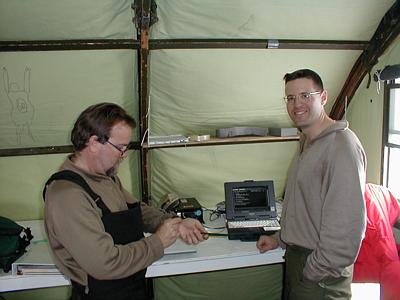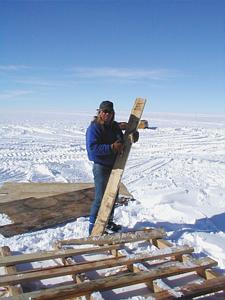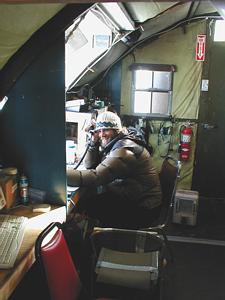29 November, 2000
Flying in the Field
Of the four science teams in camp, two have field sites that are hundreds
of kilometers away. They rely on small planes called Twin Otters to get
them to these places. For this to happen the weather must be good both at
Siple Dome and McMurdo Station where the planes are based.
Due to bad weather in McMurdo, only one flight was made last week. Shannon
Jackson, Demetri Capetanopoulos, and Alan Hogan flew to the Ford Ranges, a
mountainous area near the coast 500 km (310 mi) north of Siple Dome. They
planned to service a Global Positioning System (GPS) station located there.
The Twin Otter landed on the hard, blue ice of a glacier. The wind was so
strong they had to secure the plane with ice screws. The plane took off as
the team attempted to set up camp. They estimate the wind speed was 50 mph
with gusts to 70 mph. One of their two tents was destroyed, forcing them to
spend the night squeezed into the remaining shelter. The severe winds
prevented them from completing their mission. Fortunately, the plane was
able to pick them up the next day.
The weather has been beautiful this week but another problem has prevented
any flights from coming to Siple Dome. There has been no radio
communications for the past two days. We have had no contact with McMurdo
or any other station. The suspected cause is a solar storm like the one
that occurred earlier this month. Communications between planes and the
ground are also likely to be affected so no planes have shown up. This has
been frustrating for the teams who rely on the Twin Otter flights to
complete their projects.

A. Shannon and Demetri work for the Jet Propulsion Laboratory. They have been modifying their instruments in order to complete their project.

B. Alan has worked in a variety of locations during his several seasons in Antarctica. He is doing projects around the station while waiting for his next adventure in the field.

C. Marc Lewis, a member of the camp staff, is using the high-frequency radio. Today he couldn't get a response from McMurdo or any other station.
Contact the TEA in the field at
.
If you cannot connect through your browser, copy the
TEA's e-mail address in the "To:" line of
your favorite e-mail package.
|
